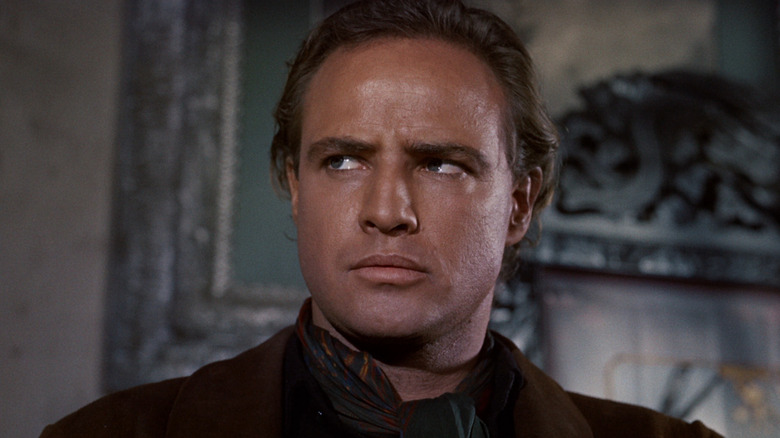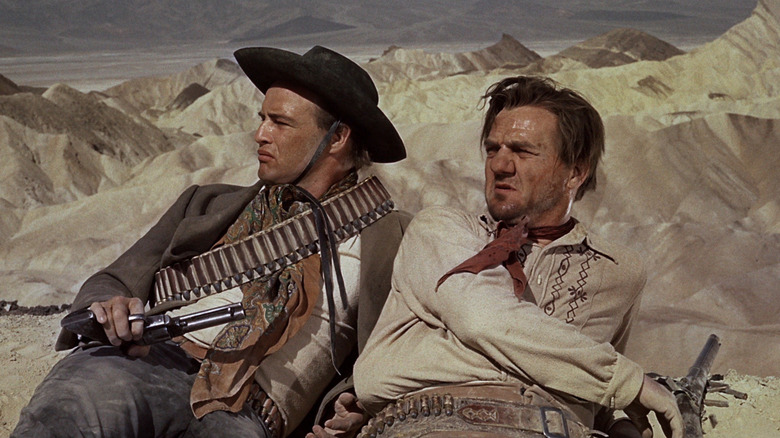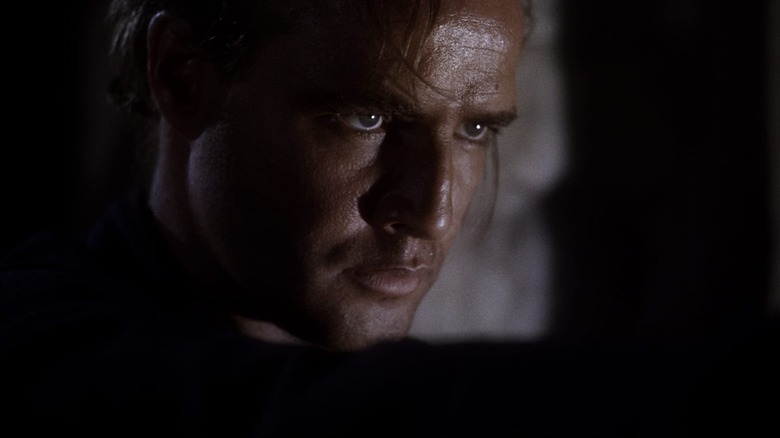Marlon Brando Butted Heads With Stanley Kubrick Over One-Eyed Jacks
I can't think of two people who would be more inherently at odds when it comes to filmmaking than Stanley Kubrick and Marlon Brando. Kubrick was a notorious perfectionist, a micro-manager who would do countless amounts of takes for every scene until he got exactly what he wanted. Brando was one of the most wild card actors out there, someone who was brilliant when he cared but often difficult to work with if he didn't. Both men had incredibly strong personalities, and I cannot imagine them sitting across from each other having a meaningful conversation of any kind, let alone developing a film to work on together.
Well, that is exactly what they were doing in the late 1950s. With Kubrick coming off his exquisite 1957 World War I film "Paths of Glory," Brando brought him on to direct an adaptation of the Western novel "The Authentic Death of Hendry Jones" by Charles Neider, which would end up being called "One-Eyed Jacks." Now, if you are familiar with the filmography of one Mr. Stanley Kubrick, you will think, "He didn't direct that," and you would be correct. Kubrick dropped out of the project just two weeks before the start of production and wound up directing the Kirk Douglas-starring "Spartacus" after that had already been shooting for a week. Ultimately, Brando took up the mantle as director, and it is his sole credit in that capacity.
This was not just your run-of-the-mill case of creative differences. This was a fundamental difference in temperament. While there's plenty out there to harangue Kubrick about, I can't really blame him for wanting out of this, as Brando was creating one of the most unproductive, unprofessional, and, frankly, annoying work environments I have ever heard about that doesn't involve actual abuse.
Three minutes
Marlon Brando was not a decisive individual. His whole approach to acting eschewed planning out what you were going to do before performing a scene. That indecisiveness can be great, but in constructing the story for a film, that doesn't work. You put that up against Stanley Kubrick, a notoriously decisive filmmaker, and you'll have problems. And they did. Recounted in the book "Eyes Wide Open" by Frederic Raphael, Kubrick recalled the story meeting that finally sent him over the edge:
"We never got anything straight. At the end of two years, Marlon decided to get decisive suddenly. He got everybody in and we had to sit round the table. He put this stopwatch on the table ... He was going to allow everybody just three minutes to tell him what their problems were ... as soon as he'd had three minutes, the buzzer would go and-bop!— that was all the time they got, no matter if they'd finished or not. So it went all the way around the table, and Marlon looked at me and said, 'Stanley, what are your problems?' And he pressed the button. 'You've got three minutes.' I said, 'Come on Marlon, this is a stupid way to do things.' And he said, 'Now you've got two minutes, 50.' So I started with what I thought had to be done on page one and page two, and I'd maybe got to page five when he said, 'That's it, you've had your three minutes.' So I said, 'Marlon, why don't you go f*** yourself?'"
If someone were to resort to that kind of childishness in a professional setting, I wouldn't have been able to last as long as Kubrick did. In hindsight, he believed Brando planned this nonsense to get him out of the way.
A ploy to be the director?
At this point in his career, Marlon Brando was at the height of his powers. He revolutionized screen acting with "A Streetcar Named Desire" and won his first Academy Award for "On the Waterfront." He wasn't just a great actor. He was a "genius," and when people are perceived as that in Hollywood, they naturally think that genius extends out to everything they do and want some power to wield it. Brando ultimately directed "One-Eyed Jacks," and I see this as the next evolutionary step in that power.
Stanley Kubrick felt that Brando always wanted to direct the movie and that the best way to get Kubrick off the picture was to annoy him until he quit. Which is exactly what happened. After the three-minute buzzer situation, Kubrick continued on to say:
"He just got up and walked into the bedroom and slammed the door ... He never came out of there. We sat around and finally all went home. I figured he'd call, but he never did. Truth was, it was all a setup. He wanted to direct the picture, which is what he did eventually. He wanted me out of there, and he couldn't figure how else to do it. That was Marlon."
"One-Eyed Jacks" is actually a pretty successful film. Brando and his frequent collaborator Karl Malden have fantastic chemistry, and Charles Lang's VistaVision cinematography is glorious. However, the movie certainly meanders quite a bit, as if Brando didn't have a firm grasp on the story's structure. Based on how these story meetings with Stanley Kubrick went, that aimlessness could not make more sense. It feels like something Brando just needed to get out of his system, and considering he never directed another movie, I think he got it out.


